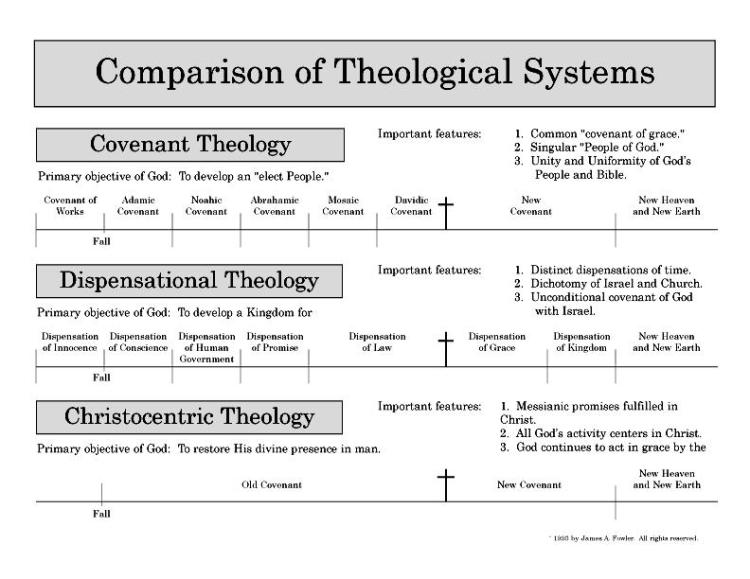 For those of you who may have missed this buried in the comments, I thought I’d draw attention to an essay by James Fowler on the differences between Dispensational Theology, Covenant Theology and Christocentric Theology.
For those of you who may have missed this buried in the comments, I thought I’d draw attention to an essay by James Fowler on the differences between Dispensational Theology, Covenant Theology and Christocentric Theology.
I think this is very important for understanding why NeoCalvinists and NeoAnabaptists often end up talking past one another.
And before anyone asks, yes, I’m unapologetically Christocentric in my interpretation of scripture.
…and your chart is one more example of why people don’t get what I’m talking about when I talk about covenant. Sigh….
…kind of like when Alan Hirsch talks about Apostolic Genius and 5-fold ministries and the former charismatics get a reactionary rash.
My kind of covenant (what I call my cHesed glasses) is very much Christocentric — the covenant is in and through him — and it is his covenant-keeping that makes us able to have relationships.
LikeLike
If covenant affirmation were equated exclusively with “covenant theology”, yes that would be a problem.
Since you’ve mentioned Alan Hirsch I should say I interpret him as theologically Christocentric, particularly given his graphical illustration of it in Forgotten Ways.
http://missionalchurchnetwork.com/wp-content/uploads/2007/06/apostolic-genius.jpg
Although he’s less Anabaptist influenced than myself and we seem to have some differences in how we engage with the homogenous unit principle, the way he emphasizes communitas over personal spirituality, discipleship over believership, resident alien mission over chaplaincy evangelism and the lordship of Jesus over the sovereignty of God is typical of Christocentrism.
LikeLike
Out of interest, I stumpled upon this comment in the wikipedia entry for Christocentric:
“…in Reformation theology, the Lutheran tradition is seen as more theologically Christocentric, as it places its doctrine of justification by grace, which is primarily a Christological doctrine, at the center of its thought. Meanwhile, the Calvinist/Reformed tradition is seen as more theologically theocentric, as it places its doctrine of the sovereignty of God (“the Father”) at the center.”
I was intruiged by the Lutheran comment. Anybody here who could verify that statement?
LikeLike
I’ve often heard people talking about “Covenant Theology”, and wondered what it was. The diagram gives me a little bit of an idea, but not much.
LikeLike
There doesn’t seem to be any place for Trinitarian theology in that schema. Nor for Pentecostals (are they Pnevmocentric?)
LikeLike
You’re right. This is far from comprehensive or succinct so more work needs to be done.
Here’s a few observations of mine:
– Covenant theology tends to be more theocentric than Christocentric. This can be seen in the Calvinist emphasis on (a) the soverignty of God over and above the lordship of Christ and (b) harmionization of differences between Old Testament and New Testament ethics.
– At first glance Pentecostals do look pneumocentric but I’m wary of jumping to quick conclusions, particularly when charismatic Calvinists and dispensationalist deliverance ministers are known to exist.
– They’re all Trinitarian in way way shape or form.
– This chart focusses on different streams of Protestant Christianity. A deeper analysis would indeed require Catholic Christianity and Orthodox Christianity be taken into account. “Mediation” strikes me as a core emphasis of Catholic theology and ethics, but as for how they relate the Old and New Covenant to one another Covenant theology would seem to be closest.
So, what would you characterize Orthodox theology by comparison? As an outsider it strikes me that apophatic theology, iconography, theosis and consensus ecclesiology are all distinctively emphasized in Orthodox theology. But I’m not sure that captures the theological core. And it doesn’t explain how you see the relationship between Old and New Covenants.
LikeLike
Very poor presentation of covenant theology in that diagram! As I understand it, covenant theology is not about historical dispensations but about the way God chooses to relate to mankind by way of covenants. Biblically, the Old Covenant is the Mosaic Law which is superseded by the New/final covenant in Christ. But even before the Mosaic covenant, God had made promises and agreements in covenant form with Abraham, Noah and Adam, and later with David. These are subsets or additions, not replacements of previous covenants.
I would argue that covenant theology, properly understood, is Christocentric because our relationship to God is judged according to our relationship to Jesus Christ.
LikeLike
Peter, I thought the article quite clearly differentiated between Covenant theology and Dispensationalist theology so I’m confused as to where you got the idea it was mergin the two. As for your last point, Covenant theology is Christocentric in some areas but some areas only. In my experience it treats Christ as an object of theology, but rarely as a theologian in his own right. Same for ethics.
LikeLike